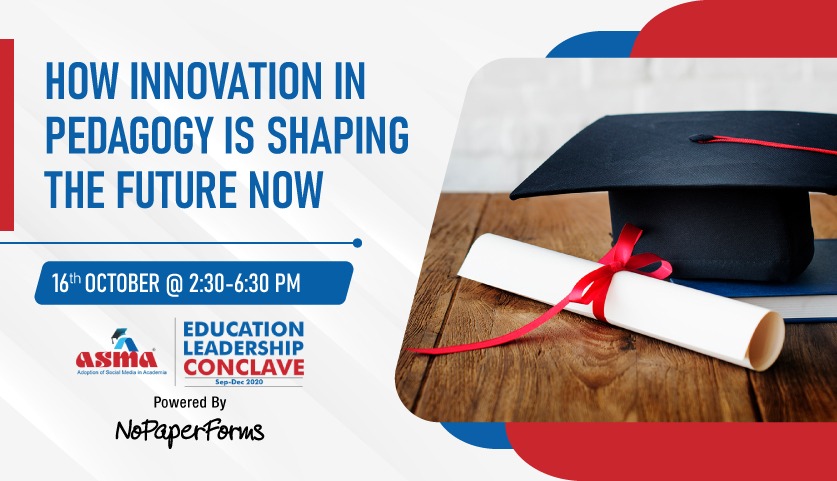ASMA Education Leadership Conclave – Higher and Tech Leadership Conclave
The virtual event was held under the theme ‘How Innovation in Pedagogy is Shaping the Future Now'
ASMA’s Education Leadership Conclave – Higher and Tech Leadership Conclave on ‘How Innovation in Pedagogy is Shaping the Future Now’ was held on 16th October 2020, and the event delved into several relevant topics of today such as the implementation of the NEP and the use of technology in various aspects of education including in admissions, academia and assessments.
The virtual event witnessed an engaging opening address by Special Guest Prof Rajive Kumar, Member Secretary, AICTE, along with three engrossing panel discussions from leaders in the Higher Education and Tech Education fields. There were also interesting industry presentations from Swapnil Jain, CEO, ORAI Robotics and Sourabh Kulkarni, Business Head – FMA Digital.
Speaking on ‘How Innovation in Pedagogy is Shaping the Future Now’, Prof Rajive Kumar, Member Secretary, AICTE pointed out that innovation in pedagogy begins with the curriculum revision. He remarked, “We have given ample space to students to explore during technical education. We have also trained close to 20,000 teachers so far”.
Prof Kumar also touched on the NEP and the role AICTE played in it implementing it. He elaborated that AICTE divided the NEP into eight parts and conducted extensive discussions with experts in various areas including from industries and academia. After which a report was compiled and shared with the Ministry of Education on the deliverables of the outcomes discussed.
He said, “If you look at the NEP, the main points are curriculum revision, teachers’ training, exams reforms, value education, internship, innovation, and industry connect as far as execution is concerned”.
He added, ‘AICTE not only came out with a quality agenda based on these points of the NEP, but we have also started executing it”.
The first panel discussed ‘NEP: Implementation & Future Challenges’ and comprised of Dr Vikas Singh, Executive Director, ITS Education Group, Vishal Sood, Executive Director, Maharishi Markandeshwar University, Dr Parag Sanghani, Vice-Chancellor, PP Savani University, Dr Sunil Rai, Vice-Chancellor, UPES and Dr Pramod Kumar Naik, Pro-Vice-Chancellor, Dr CV Raman University. The panel was moderated by Atul Khosla, Founder & Pro Vice-Chancellor, Shoolini University.
The panel delved into the topic of the NEP and shared their thoughts regarding its implementation, the challenges they foresee and how the policy is expected to revolutionise the Indian education system.
The second panel discussed ‘How the Process Should be Simplified from Admission, Enrollment, and Assessment to Academics?’ The panel was moderated by Dr Lakshmi Mohan, Director, ITM Business School, Kharghar and comprised Dr Ketan Kotecha, Director, Symbiosis Institute of Technology, Dr Indu Rao, Director, Vellore Institute of Technology, Dr Neha Patel, Director, Som Lalit Institute of Management Studies, Ahmedabad, Dr Bigyan Verma, Director, SIES College of Management Studies, Mumbai and Dr Balakrishna Shetty, Vice-Chancellor, Sri Siddhartha University Tumakuru, Bangalore.
The panel explored how processes such as admissions, academics and assessments can be simplified, especially in the context of the pandemic. Moderator Dr Lakshmi Mohan, Director, ITM Business School remarked, “Innovation is wings to the education world, to fly farther and faster in its continuous evolution. We need to manage education through adopting 21st-century skills”.
The panel also discussed how innovation and technology can be used in all aspects and process, from admissions to assessments, even in recruitments.
Dr Balakrishna Shetty, Vice-Chancellor, Sri Siddhartha University Tumakuru, Bangalore, explained that his institution sees this year as a transitional year rather than a lost academic year. He emphasized the need for assessments rather than examinations and evaluations and that teaching should be based on a concept called ‘answer first and discuss next’.
The speakers also highlighted the need to focus on teacher and faculty development and training.
The final panel of the day was moderated by Suraj Sapra, Chief Strategy Officer, NoPaperForms and was comprised of Dr Pankaj Sharma, Director – Admissions & Outreach, SRM University, Delhi NCR, Sonepat, Amit Phull, Chief Marketing Officer, Sushant University, Gurugram, Ashu Diwan, Head-Outreach, BML Munjal University, Gurugram, Devinder Narain, Director, Corporate Relations, Shobhit University and Sudhanshu Varma, COO, Bennett University, Greater Noida.
The panel explored the ‘Role of Technology in Efficient Management of Admissions’. The speakers agreed that the COVID-19 pandemic has provided a push towards adopting technology in various areas of the education system, including in admissions. Sudhanshu Varma, COO, Bennett University, Greater Noida said that the pandemic has changed the way their teams think and he shared that Bennett University has gotten most of their admissions through technology.
Dr Pankaj Sharma, Director – Admissions & Outreach, SRM University, Delhi NCR, Sonepat, noted that in 2020 we have all become heavily dependent on technology, and opined that we need to have more involved use of technology which comes from a change in mindset.
Ashu Diwan, Head-Outreach, BML Munjal University, Gurugram remarked that the shift towards the use of technology had already begun but the pandemic has accelerated this shift.
Speaking about how technology can be effectively used in the education sector, Amit Phull, Chief Marketing Officer, Sushant University, Gurugram gave an example of his own institution and that it was helpful to create and compare milestones. He also pointed out that digital will have its own deliverables and its own limitations, therefore just like teaching, there has to be a blended way of marketing.
Moderator Suraj Sapra, Chief Strategy Officer, NoPaperForms emphasized that adoption of technology is not the only key element, it is important to look at what kind of technology is being adopted.
Concluding the session, Devinder Narain, Director, Corporate Relations, Shobhit University shared a wonderful analogy between technology and food, saying, “Before, technology was like coriander, it was just a garnish. Today it is like salt, without it, there is no taste. However, too much of salt in food will ruin the taste”.



